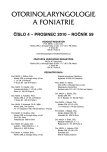Obstructive Sleep Apnea – the Importance of Septoplasty and Turbinoplasty
Part II (Practical)
Authors:
T. Pniak 1; Petr Matoušek 1
; P. Štrympl 1; V. Novák 2; Pavel Komínek 1
Authors‘ workplace:
Klinika ORL Fakultní nemocnice Ostrava
; přednosta doc. MUDr. P. Komínek, Ph. D., MBA
Klinika dětské neurologie Fakultní nemocnice Ostrava
1; přednostka MUDr. M. Kunčíková
2
Published in:
Otorinolaryngol Foniatr, 59, 2010, No. 4, pp. 186-189.
Category:
Original Article
Overview
Objective:
The purpose of this paper was to evaluate the effect of septoplasty and turbinoplasty in the treatment of obstructive sleep apnoe (OSA) and snoring (rhonchopathia)
Material and methods:
Authors present specimen of 20 patients with decreased nasal patency and snoring. There was nasal septal deviation and inferior turbinate hypertrophy observed by rhinoendoscopy and surgical correction was performed. Preoperatively and postoperatively rhinomanometry and limited polygraphy was obtained, with special emphasis on AHI (Apnoe/Hypopnoe Index) and SI (Snoring Index). Subjective outcome and daytime sleepiness has been evaluated also.
Findings:
In patients, OSA was detected, none patient suffered from benign snoring. Postoperatively, significant decrease of AHI (p=0.0038) and SI (p= 0.0441) was described, even though criterion of successful surgical treatment of OSA has not been reached. There was improvement of nasal patency, proved by rhinomanometry. Decrease of snoring has been observed subjectively.
Conclusion:
Nasal surgery is an additional method of treatment of OSA.
Key words:
septoplasty, obstructive sleep apnea, rhonchopathy, rhinomanometry.
Sources
1. Fairbanks, D.: Effect of nasal surgery in the management of sleep apnea. Ann. Otorinolaryngol, 94, 1985, s. 550-554.
2. Fitzpatrick, M. et al.: Effect of nasal or oral breathing route on upper airway resistence dutiny sleep. Eur Respir. J., 22, 2003, s. 827-832.
3. Hermann, K., Verse, T.: Surgery for slep disordered breathing. Berlin Heidelberg, Springer 2005, s. 9-19.
4. Kenny, P.: One-stage nasal and multi-level pharyngeal surgery for obstructive sleep apnoea: safety and efficacy. Th Journal of Laryngology & Otology, 119, 2005, s. 272-276.
5. Kimoff, R., Sforza, E., Champagne et al.: Upper airway sensation in snoring and obstructive sleep apnea. Am. J. Respir. Crit. Care Med., 164, 2001, s. 250-255.
6. Komínek, P., Chrobok, V., Astl, J. et al.: Záněty hltanu. Havlíčkův Brod, Tobiáš, 2005, s. 120-207.
7. Kountakis, S., Őnerci, M.: Rhinologic and sleep apnea surgical techniques. Berlin, Heidelberg, Springer, 2007, s. 255-378.
8. Kuchynková, Z., Andrle, J., Vrabec, P.: Rinomanometrie v indikaci a hodnocení výsledků septoplastik. Otorinolaryngol. /Prague/, 47, 1998, s. 40-43.
9. Li, H., Lee, L., Wang, P. et al.: Nasal surgery for snoring in patiens with obstructive sleep apnea. Laryngoskope, 118, 2008, s. 354-359.
10. Li, H., Lin, Y., Chen, N. et al.: Improvement in quality of life after nasal surgery Alone for patiens with obstructive sleep apnea and nasal obstruction. Arch. Otolaryngol Head Neck Surg., 134, 2008, s. 429-433.
11. Lofaso, F. et al.: Nasal obstruction as a risk factor for sleep apnoea syndrome. Eur Respir. J., 16, 2000, s. 639-643.
12. McLean, H. et al.: Effect of treating severe nasal obstruction on the severity of obstructive sleep apnea. Eur Respir. J., 25, 2005, s. 521-527.
13. Nevšímalová, S., Šonka, K. et al.: Poruchy spánku a bdění. Praha, MAXDORF s.r.o., 1997, s. 56-144.
14. Plzák, J., Klozar, J., Betka, J.: Obstrukční syndrom spánkové apnoe: diagnóza a léčba, Otorinolaryngolog. a Foniat. /Prague/, 51, 2002, s. 216-220.
15. Rappai, M., Callop, N., Kemp, S., deShazo, R.: The nose and sleep-disordered breathing: What we know and what we do not know. Chest, 124, 2003, s. 2309-2322.
16. Sériés, F., Pierre, S., Carrier, G.: Surgical correction of nasal obstruction in the treatement of mild sleep apnoea: Importace of cephalometry in predicting outcame. Thorax, 48, 1993, s. 360-363.
17. Sher, A. E., Kenneth, B., Piccirillo, J.: The efficacy of surgical modifications of the upper airway in adult with obstructive sleep apnea syndrome. Sleep, 19, 1996, s. 157-177.
18. Verse, T., Maurer, J. T., Pirsing, W.: Effect of nasal surgery on sleep related breathing disorders. Laryngoskope, 112, 2002, s. 64-68.
19. Virkkula, P., Bachour, A., Hytönen, M. et al.: Snoring is not relieved by nasal surgery despite improvement in nasal resistence. Chest, 129, 2006, s. 81-87.
20. Woodson, B.: Predicting which patiens will benefit from surgery for obstructive sleep apnea: The ENT exam. Ear, Nose & Throat Journal, 78, 1999, s. 792-800.
21. Zborayová, K.: Nosní obstrukce - objektivizace a možnosti léčebného ovlivnění. Dizertační práce, Univerzita Karlova v Praze, Lékařská fakulta v Hradci Králové. Hradec Králové, 2009, s. 24-46.
Labels
Audiology Paediatric ENT ENT (Otorhinolaryngology)Article was published in
Otorhinolaryngology and Phoniatrics

2010 Issue 4
-
All articles in this issue
- Ototoxicity Induced by Cisplatin – Clinical Observation and Determination of Individual Sensitivity
-
Obstructive Sleep Apnea – Importance of Septoplasty and Turbinoplasty
Part I (Theoretical) -
Obstructive Sleep Apnea – the Importance of Septoplasty and Turbinoplasty
Part II (Practical) - Evaluating the Quality of the Glottis Closure
- PFAPA Syndrome in Child ENT Area and Its Indication for Tonsillectomy
- Kawasaki Syndrome – Possible Cause of Cervical Lymphadenitis in Children
- Vestibular Evoked Myogenic Potentials – VEMP: Method Standardization
- Survey of Methodical Procedures in a Subjective Description of Properties of Vocal Speech Manifestations in the Area of Disorders, Pathology and Therapy of Voice
- Endoscopic Autofluorescence for Diagnosis of Laryngeal Tumors
- Bone Vibrator Anchored into the Skull (BAHA) – Our Experience
- Present Possibilities of Therapy in Relapsing Papillomatosis of Larynx
- Otorhinolaryngology and Phoniatrics
- Journal archive
- Current issue
- About the journal
Most read in this issue
- PFAPA Syndrome in Child ENT Area and Its Indication for Tonsillectomy
- Kawasaki Syndrome – Possible Cause of Cervical Lymphadenitis in Children
- Vestibular Evoked Myogenic Potentials – VEMP: Method Standardization
-
Obstructive Sleep Apnea – the Importance of Septoplasty and Turbinoplasty
Part II (Practical)
